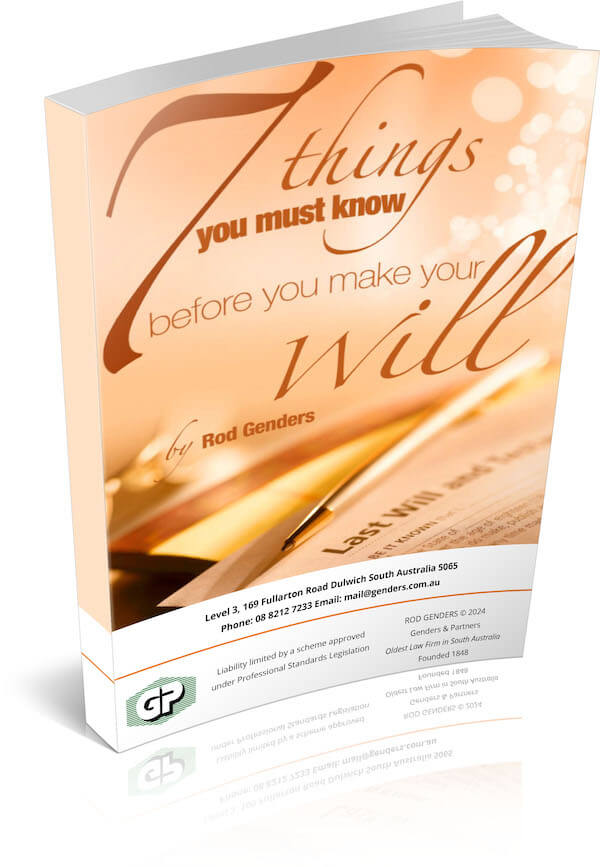
Updated April 2025
Several times each year my phone rings and someone asks me how they can locate and view the Will of someone close to them.
The circumstances of these requests vary, but can be broken down into two main groups:
- Someone has recently died, and their relative wants to know if they are a beneficiary; or
- An elderly person is becoming forgetful and their relative is concerned that they have been coerced into changing their Will, and they want to satisfy their curiosity.
The contents of a Will are private and are not able to be disclosed without the testator’s authority until after they have died.
In Australia, a Will becomes a public record when it has been admitted to probate – which may not be required in every case. Once the Will has been admitted to probate, anyone can then request a copy from the Court. In South Australia, it may be possible to simply search online at CourtSA to view the Will electronically.
Before a person dies, very few people have a legitimate entitlement to demand access to their Will, and then only in specific circumstances.
The Succession Act 2023 (SA) (the Act) commenced operation in South Australia on 1 January 2025 and introduced a number of key changes to estate planning and the administration of deceased estates in South Australia.
The Act replaces the Wills Act 1936, the Administration and Probate Act 1919 and the Inheritance (Family Provision) Act 1972 to overhaul and modernise succession law in South Australia.
Right to inspect the Will
Under section 48 of the Act, certain people will be entitled to inspect the Will of a deceased person. This includes:
- A person named or referred to in the Will (whether as a beneficiary or not). This means that if you include a statement in your Will about a person who you have not benefitted in your Will, that person has the right to inspect the Will;
- A person named or referred to in an earlier Will;
- Surviving spouse and domestic partners, or former spouses and domestic partners;
- Parents or guardians of the deceased person; and
- A person who would be entitled to share in the estate of the deceased if the deceased had died intestate.
Importantly, this right only arises when the Testator (Will-maker) has died.
A person with possession or control of the Will must allow these people to inspect or be given copies of the Will.
Persons who have claims against the estate in law or equity may also inspect the Will in certain circumstances, but only with the permission of the Supreme Court.
After a testator has died, and once their Will has been lodged at Court – generally as a routine part of the probate process – then access to the Will is typically governed by a mixture of Rules of Court and Administration & Probate laws & rules, which are fairly uniform throughout the States and Territories of Australia.
However, the time-period between the death of the testator and the application for the Grant is not as uniformly-controlled, giving rise to unexpected results and potential injustices in some jurisdictions.
In recent years, I have received increasing numbers of enquiries from persons with ostensibly legitimate interest in the Will of a deceased person, but have met with obstruction by the custodian of the Will, who in South Australia until 2025 had no obligation to disclose any information about the Will or its contents. This changed on 1st January 2025 when the new SA Succession Act commenced.
Whether the original Will is held by a solicitor or by someone else, their authority to retain custody of such a document following the confirmed death of the Testator can only emanate as follows:
- The Will belongs to the estate, and the Executor(s) named therein has ostensible authority to deal-with and bind the estate;
- However, the legitimacy of the Executor’s authority turns upon the validity of the Will which may be susceptible of challenge;
- If the custodian of the Will (be it Executor or solicitor-upon-instructions) is obstructive, and the requestor is put to the extra cost and delay of Court action, merely to determine the contents of the Will, to inform their decision as to whether a challenge or claim should be made in the first place, then the custodian could find themselves having to pay the Court and legal costs of all parties.
What if the testator is alive?
There are some circumstances where you might be able to obtain a copy of the Will before the testator has died. For example:
- You can request a copy directly from the testator and the testator can decide to provide a copy to you – though, the testator can say no!
- If you are the testator’s agent under Enduring Power of Attorney, there may be a specific power in the document that allows you to obtain a copy of the Will after the testator has lost legal capacity. This would be fairly unusual. This power needs to be specifically stated in the Power of Attorney document and only the agent can view the Will (and they have no right to change or revoke it).
If contained in the Power of Attorney, this power is given so that the agent can confirm that the sale of certain assets to benefit the testator will not defeat the intended gifting under the Will.
In some states, an agent has the right to obtain a copy of the Will in certain circumstances – but this differs from state to state and you should get specific advice for your situation.
In some circumstances, the Court may make an order ordering the release of a copy of the Will if it is considered necessary to resolve a dispute.
Even though you might be able to look at a Will before the testator dies, it is important to remember that if the testator has testamentary capacity, they are able to revoke and replace their Will – so what you read is subject to change!
What if the testator has died?
Not every Will is admitted to probate, or you may want to see a copy of the Will before it is admitted to probate. If you are the Executor of the Will, you are entitled to see the Will so that you can administer the Estate.
The Executor is entitled to collect the original Will. If the Will is held by a law firm, you will usually be required to provide evidence that the testator has died and provide documents to verify your identity before the Will is released to you.
In some states (now including SA), you just need to be named in the Will to see a copy of it. In other states, you are only entitled to see a copy of the Will if you are named as a beneficiary.
In some states (such as South Australia), a beneficiary is not entitled to see a copy of the Will until after the Executor has obtained a Grant of Probate.
It will be seen that this law is not uniform across Australia so it depends on the circumstances.
In some circumstances, the Court may make an order ordering the release of a copy of the Will if it is considered necessary to resolve a dispute.
Unfortunately, the rules are not uniform across Australia or straightforward. Your entitlement to see someone else’s Will really depends on the circumstances and where the Will is located.
If you would like further advice about administering an estate, or if you are concerned an Executor is not administering an estate properly, contact our friendly team.
If you are dealing with an issue relating to access to a Will, we can help clarify the situation.
When it comes to Wills, Probate, Deceased Estates, asset protection & estate planning in Australia, you can trust the oldest law firm in South Australia, Genders & Partners to guide you through the tough decisions you must make for your family’s future care and welfare.
If you have any questions, or would like further information, please email us. Would you like a quick phone call to discuss? Feel free email us or use this link and book a timeslot for a free 15-minute phone consultation on my schedule
We can help you to protect yourself and your family. We look forward to being of service.
Want to find out more?
More Estate Administration Resources
All these and many more Probate and estate topics are available for discussion with the oldest law firm in South Australia.
Disclaimer
The information contained in this document is intended as general information only and has been prepared without taking into account the needs, objectives or financial information of any particular person.
Prior to making any decision, you should assess whether the information is appropriate to your particular needs, objectives and financial circumstances.
While Genders and Partners has taken reasonable care in the preparation of this information, subsequent changes in circumstances (including legislative change) may occur at any time and may impact on the accuracy of this information.
eBook “7 Things You Must Know Before You Make Your Will”
In this eBook you will Learn:

Why home-made Wills can be a LOT more expensive than you might think.
The secret weapons used by the rich & powerful to protect their assets, and transfer their wealth two or three generations ahead.
How Estate and Trustee Companies make BIG money from “free” Wills.
The Most Common Estate Planning Mistakes, how they can cost your family a fortune, and How to Avoid Them.
The Elements of a Sound Estate Plan – why a Will alone is not enough.
How to Make Sure Your Assets Stay in Your Family and are not lost to creditors, lawsuits or ex-spouses.
How to guard against challenges to your Estate after you’re gone.







